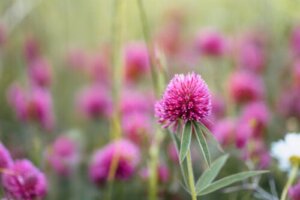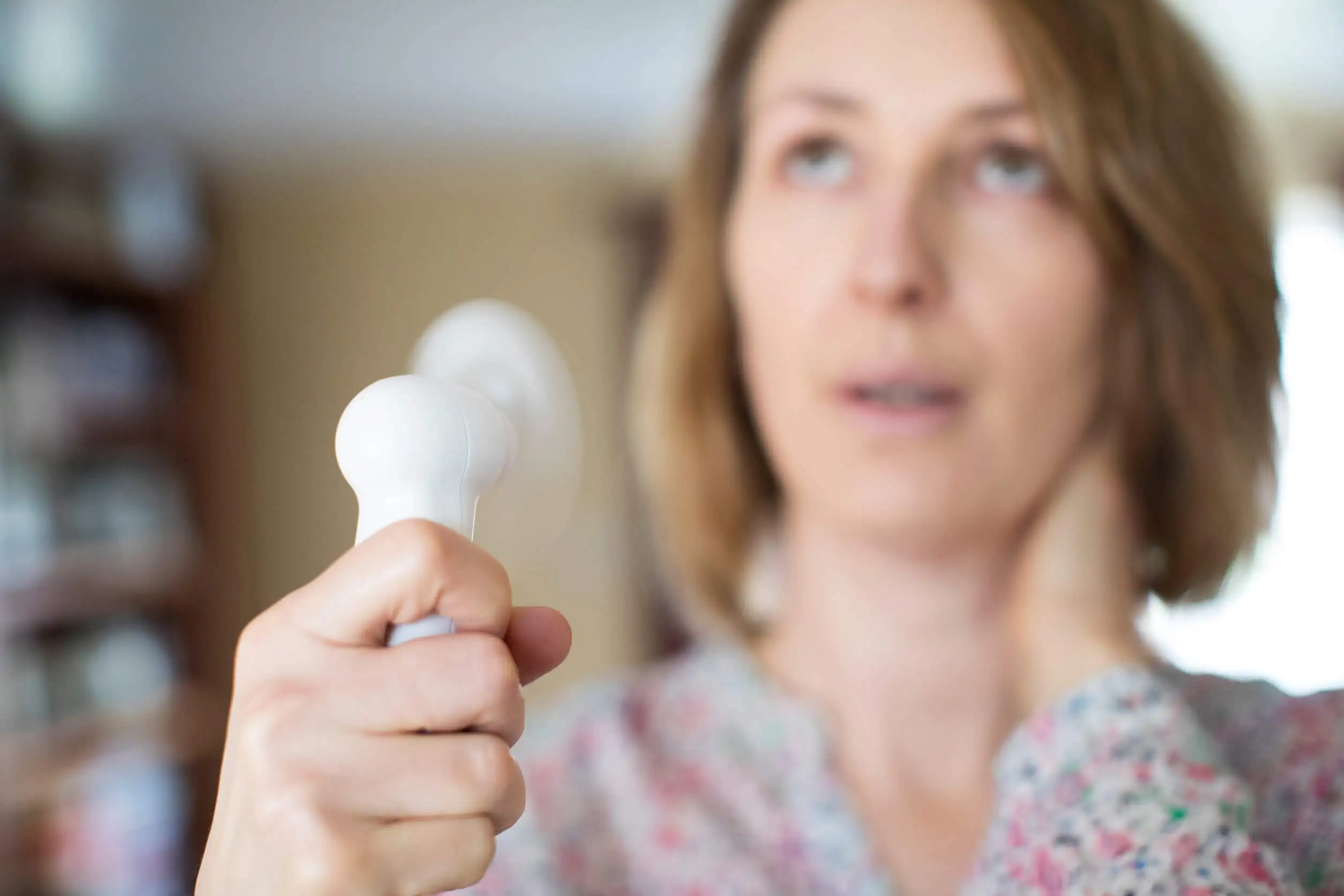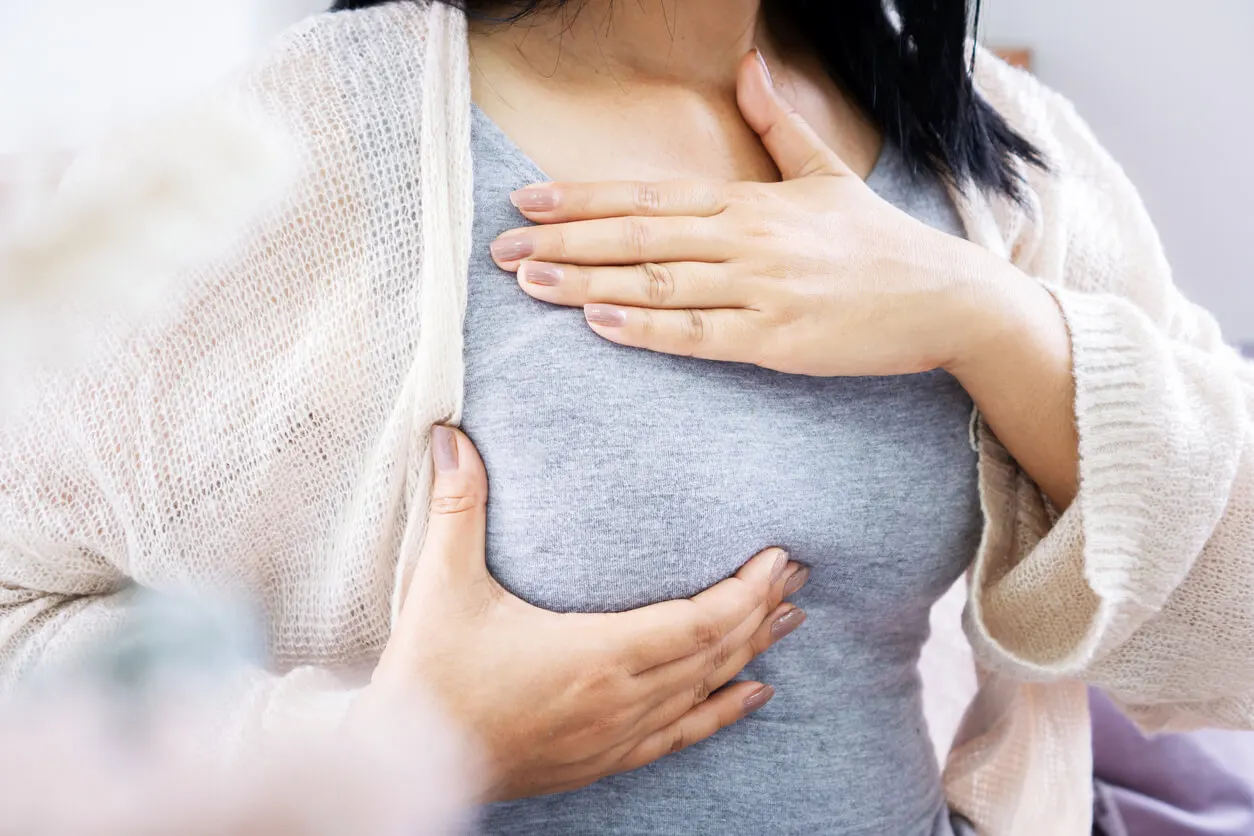Red Clover for Menopause: Is It Effective?


Reviewed and approved by the pharmacist Franciele Rohor de Souza
Red clover is used to mitigate menopausal symptoms. Due to its content of phytoestrogens -substances that act similarly to female hormones (estrogens)-, it’s associated with hormonal balance at this stage.
This product is obtained from the Trifolium pratense plant, which belongs to the legume family. It grows wild in the soils of Europe and Asia, but also in meadows in North America. Its small flowers in shades of red, pink and off-white are often used for therapeutic purposes.
To be more precise, it’s often used as an adjunct for asthma, whooping cough, high cholesterol, bone health and, of course, menopause. In the following article, we’ll focus on the latter condition and tell you what the research says.
Is red clover useful to reduce menopausal symptoms?
Red clover (Trifolium pratense) can be purchased in the market in different presentations. The dried herb for tea preparation is usually one of the most commonly used. However, tablets, powder, extracts, topical treatments, and tinctures can also be found.
Popular literature has linked its consumption with an improvement in menopausal symptoms. Specifically, it’s claimed to reduce nighttime hot flashes, bone demineralization, headaches, and the risk of chronic diseases, such as cardiovascular disease. But is there any evidence?

Research on red clover and its effects on menopause
In recent decades, the potential of red clover and its derivatives for the reduction of menopausal symptoms has been studied. Thus, it was determined that it concentrates phytoestrogens such as daidzein, genistein, biochanin A, and formononetin, associated with various benefits.
However, opinions on its effects in alleviating menopause remain divided. A literature review shared in the National Center for Biotechnology Information states that there’s insufficient evidence to support the effectiveness of semi-purified red clover isoflavone extracts in relieving climacteric vasomotor symptoms (hot flashes and sweating).
Even so, this same review concludes that the plant has a possible positive impact on the health care of mature, menopausal women. It was reported to have potential for the maintenance of bone health and the prevention of atherosclerosis.
Meanwhile, a review in the American Journal of Obstetrics and Gynecology found that women taking red clover experienced a moderate decrease in hot flashes compared to the placebo group. For other menopausal symptoms, such as mood, sexual problems, and sleep disturbances, a minor effect was observed. This suggests that the plant may indeed be helpful for women in this stage.
This is supported by a more recent meta-analysis, shared through the journal Nutrients, which reported that red clover extracts produce a “moderate effect” in decreasing the daily frequency of hot flashes. Still, the researchers stress the need for more conclusive evidence.
Read more here: 5 Herbal Remedies that Help Stimulate Your Lymphatic System
Possible effects on lipid profile and bone health
Apart from decreasing hot flashes, red clover supplements provide additional benefits to perimenopausal and postmenopausal women. A meta-analysis shared in the journal Maturitas reported that isoflavones derived from this plant support lower total cholesterol concentrations.
In turn, a study shared in Nutrients highlights that red clover’s anthocyanins and isoflavones confer anti-inflammatory and antioxidant properties. Since they inhibit the negative effects of oxidative stress, they also benefit cardiovascular health.
Regarding its effects on the prevention of bone demineralization, a study in Evidence-Based Complementary and Alternative Medicine reported that daily consumption of a red clover extract is beneficial for bone health in healthy menopausal women.
In particular, participants received a daily dose of 150 ml of a red clover extract containing 37.1 mg of isoflavones. After 12 weeks, a protective effect on bone mineral density loss was observed. However, larger and longer studies are needed to confirm these effects.
Possible side effects and contraindications
Information shared by the Icahn School of Medicine at Mount Sinai details that no serious side effects have been reported from taking red clover for up to one year. Some possible adverse reactions include nausea, headache, and rashes.
People at risk for breast cancer should consult a doctor before ingesting this type of supplement. Research has determined adverse effects – cell proliferation and apoptosis – of isoflavones on breast cancer cells in vitro and in vivo. Therefore, for safe use, it’s essential to seek advice from a specialist.
This plant also increases the risk of bleeding. For this reason, its simultaneous consumption with anticoagulant drugs isn’t recommended. Nor should it be taken with oral contraceptives and anticancer drugs.
For safety reasons, it should be avoided in the following cases:
- Young children
- Pregnancy and lactation
- Patients with cancer or neoplastic history

Suggested dosage
Red clover supplements often suggest doses of 40 to 80 mg per day. This may vary depending on the manufacturer. Therefore, it’s necessary to consult the label. Any questions should be resolved with your herbalist or physician.
Another great article: Hormonal Changes in Menopause
What to remember?
In various pieces of research, red clover has shown potential as an adjuvant to reduce menopausal symptoms. Still, researchers stress the need for more comprehensive studies to corroborate these effects. For now, the supplement can be found in herbal stores and pharmacies. It’s generally considered safe for most healthy women. However, it’s recommended to consult a doctor before taking it on a regular basis.
All cited sources were thoroughly reviewed by our team to ensure their quality, reliability, currency, and validity. The bibliography of this article was considered reliable and of academic or scientific accuracy.
- Lipovac M, Chedraui P, Gruenhut C, Gocan A, Stammler M, Imhof M. Improvement of postmenopausal depressive and anxiety symptoms after treatment with isoflavones derived from red clover extracts. Maturitas. 2010 Mar;65(3):258-61. doi: 10.1016/j.maturitas.2009.10.014. Epub 2009 Nov 30. PMID: 19948385.
- Wang SW, Chen Y, Joseph T, Hu M. Variable isoflavone content of red clover products affects intestinal disposition of biochanin A, formononetin, genistein, and daidzein. J Altern Complement Med. 2008 Apr;14(3):287-97. doi: 10.1089/acm.2007.0617. PMID: 18370585; PMCID: PMC2771774.
- Database of Abstracts of Reviews of Effects (DARE): Quality-assessed Reviews [Internet]. York (UK): Centre for Reviews and Dissemination (UK); 1995-. Clinical studies of red clover (Trifolium pratense) dietary supplements in menopause: a literature review. 2006. Available from: https://www.ncbi.nlm.nih.gov/books/NBK73154/
- Ghazanfarpour M, Sadeghi R, Roudsari RL, Khorsand I, Khadivzadeh T, Muoio B. Red clover for treatment of hot flashes and menopausal symptoms: A systematic review and meta-analysis. J Obstet Gynaecol. 2016;36(3):301-11. doi: 10.3109/01443615.2015.1049249. Epub 2015 Oct 15. PMID: 26471215.
- Kanadys W, Barańska A, Błaszczuk A, Polz-Dacewicz M, Drop B, Kanecki K, Malm M. Evaluation of Clinical Meaningfulness of Red Clover (Trifolium pratense L.) Extract to Relieve Hot Flushes and Menopausal Symptoms in Peri- and Post-Menopausal Women: A Systematic Review and Meta-Analysis of Randomized Controlled Trials. Nutrients. 2021 Apr 11;13(4):1258. doi: 10.3390/nu13041258. PMID: 33920485; PMCID: PMC8069620.
- Kanadys W, Baranska A, Jedrych M, Religioni U, Janiszewska M. Effects of red clover (Trifolium pratense) isoflavones on the lipid profile of perimenopausal and postmenopausal women-A systematic review and meta-analysis. Maturitas. 2020 Feb;132:7-16. doi: 10.1016/j.maturitas.2019.11.001. Epub 2019 Nov 10. PMID: 31883666.
- Lee SG, Brownmiller CR, Lee SO, Kang HW. Anti-Inflammatory and Antioxidant Effects of Anthocyanins of Trifolium pratense (Red Clover) in Lipopolysaccharide-Stimulated RAW-267.4 Macrophages. Nutrients. 2020 Apr 15;12(4):1089. doi: 10.3390/nu12041089. PMID: 32326385; PMCID: PMC7230587.
-
Ziaei S, Halaby R. Dietary Isoflavones and Breast Cancer Risk. Medicines (Basel). 2017 Apr 7;4(2):18. doi: 10.3390/medicines4020018. PMID: 28930233; PMCID: PMC5590054.
This text is provided for informational purposes only and does not replace consultation with a professional. If in doubt, consult your specialist.








